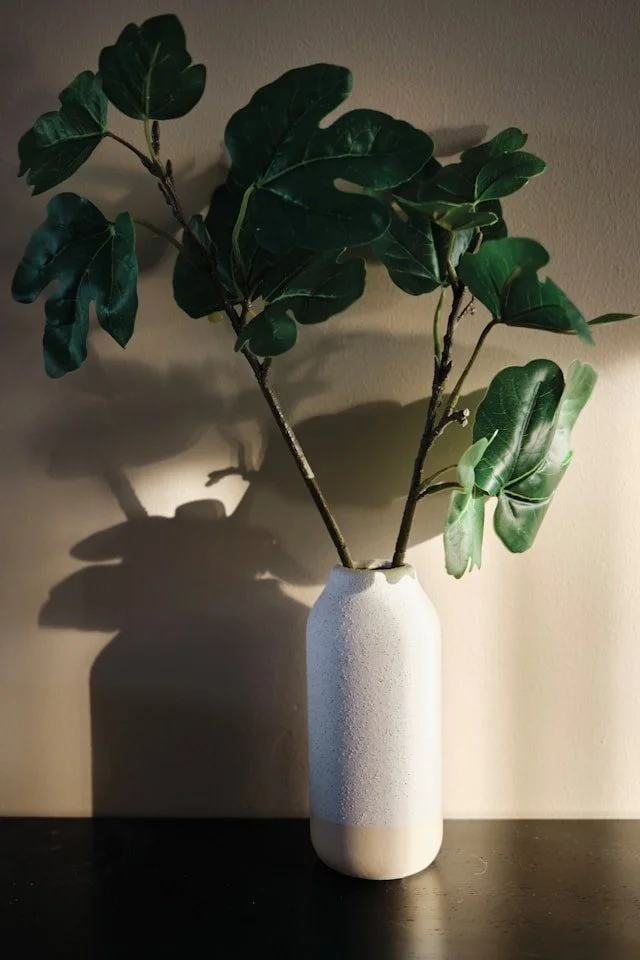How Christians can inadvertently moralize unpleasant emotions: Brad Hambrick asks, “’What percentage of our unpleasant emotions are accounted for by sin and how much by suffering?’ The simple answer is, “We don’t know.” If anyone says with confidence that most unpleasant emotions are caused by one or the other, they are merely revealing their bias.”
Everything matters: Christa Threlfall says, “It’s not enough to eliminate the “big sins” that other people can see; Jesus wants every part of our being to belong to him.”
This Week's Recommendations
Jesus doesn’t use fake plants: Casey McCall writes, “I get the appeal of fake plants. We want the fruit without the work, the aesthetic without the need to provide care. In my house, we’ve killed our fair share of indoor plants by neglecting to provide water and sunlight. Nonetheless, I’d rather have no plants than fake ones.”
Discipline, delight, and staying on the path: Glenna Marshall begins, “My husband and I took our kids on a hike not too long ago, and before we hit the trail, we warned both of our sons to stay on the path at all times. The woods were filled with poison ivy, and one of my sons is quite the explorer.
This Week's Recommendations
How much money do I need for retirement? A helpful article from Life Institute no matter how old you are.
Sin causes anxiety, too: Casey McCall with a helpful article reflecting on connection (sometimes) between sin and anxiety, “Christians today would do well to consider sin as a possible cause of mental illness even as we follow Murray’s advice to avoid pinning all mental illness on sin.”
This Week's Recommendations
Why am I so spiritually dry? Glenna Marshall reflects, “I couldn’t think of any particular trigger. No big reason stood out to me that would explain why everything felt stale and stagnant inside.”
When offenses come: Scott Hubbard encourages us to reframe when we’ve been sinned against, “Offenses are gifts wrapped with dark ribbons. So don’t let the packaging deceive you. Every snub and jab and wound invites you into deeper fellowship and joy with your forgiving Lord.”
This Week's Recommendations
How Christians can fight the war on lies: Joe Carter lays out four fronts of the war on truth: emotional, narrative, institutional, and tribalistic. He concludes, “In following the way of Jesus, we preserve our witness and offer hope to a world drowning in deception. For in Christ, we find not just the truth that sets us free but the strength to stand firm in that truth, come what may.”
Impossibly, gradually, miraculously changed: Glenna Marshall with a post that drips with hope! “They glint in the morning light, impossibly shiny and smooth. Where they lived and how they lived in nature made them what they are. Some have tiny holes in them where scavenging snails once drilled in through their delicate exterior for prey. The shiny surface tells the story, imperfections and all. Their bodies keep the score, if you will.
This Week's Recommendations
A sickness in pursuing health: Trevin Wax considers some of the excesses of the movement toward long and healthy living. “If this life is all there is, then the pressure to optimize your body and extend your life as long as possible makes sense. But if there’s more to life than this existence and more to “making the most” of life than physical prowess, then the pursuit of longevity and health can sabotage itself.”
When God takes his time: I love everything Glenna Marshall writes. This is so filled with wisdom, “The problem is this: we rarely assume that God is purposeful and kind in his long game.
This Week's Recommendations
Who would I be if I was happy? Trevin Wax warns us, “Many young people are increasingly drawn to establishing and expressing their identities through their psychological maladies.”
Wherever he leads, I’ll go: Glenna Marshall shares a story I bet you might identify with, “In young, untried faith, I nearly invited him to test me, telling him in a long, journaled prayer that wherever he led, I would most certainly go. I banked on my obedience. I would be stalwart, no matter what came. But life came. And the Lord led me to places I longed to escape from: decades of infertility, disease, chronic pain that battered my body for years on end.”
What I Read in 2023 (and perhaps some books you might want to read in 2024)
This year, Angel and I celebrated the release of our first book, Trading Faces. Any author knows how much of their heart they pour into writing and the blessing it is to have people interact with what you’ve crafted on the page. We’ve been so encouraged by those who have written us to share ways the book has impacted them. Laboring over the art of writing has made me a more charitable reader. I know how easy it is for my writing to become aimless, for ideas in my mind to become muddled on the page.
This Week's Recommendations
Help! My Employer Celebrates Gay Pride and Pays for Abortion Travel: Miranda Carls steps into a conversation that impacts many. She wisely treads lightly, “Christian decision-making doesn’t rest squarely on the shoulders of human understanding. It doesn’t fit into a neatly organized decision tree of binary questions.”
Harvesting Idols: Chris Thomas warns us, “Though I reason with myself that money is not the problem, but instead the love of it, the very presence of wealth is a danger to my soul.”
Why the Church? HB Charles shoots straight, “’Unchurched Christian’ is not a biblical category. Ask Paul, John, or Peter what they think about unchurched Christians and they would have responded, ‘Why are you calling them Christians, if they are not a part of the church?’”
Remember: Glenna Marshall reflects on a hard year, “I want to always remember. Pain teaches us to be thankful. Grief keeps us near the cross. Remembering recounts God’s faithfulness. While there are events people experience that cause levels of trauma that must be counseled and handled delicately, what I’m talking about are those significant sequences of suffering that the Lord draws us through that change us, sanctify us.”
Comedy Wildlife Awards: I always enjoy these. How about that squirrel or the big cat’s face plant into the tree?
It’s a Wonderful Telescope: A fun and beautiful connection between the classic Christmas movie and the James Webb telescope you probably didn’t know (I didn’t!).
This Week's Recommendations
A Call to Raise Daughters Wise to Domestic Abuse: Excellent article by Jeremy Pierre. He begins, “’If your future husband ever lays a finger on you, you better tell me so I can kill him.’ This is the extent to which many dads address abuse with their daughters. It feels effective because it’s simple, protective, and tough. And it also feels kind of awesome to say.
Loving With a Limp: Chris Thomas writes, “Maybe, like Jacob, an encounter with God will leave you living life with a limp, serving with a limp, worshiping with a limp; loving with a limp.”
Cords Have Memory: Lauren Washer likens the memory of electrical cords with our inner lives. “Our inner lives have a similar type of cord memory. We inherit ideas, values, and belief systems from our families, faith backgrounds, and cultural surroundings. Many of these are good and right. But sometimes, the way we’ve always done things or thought about things, isn’t good.”
Bend Me Toward the Light: Glenna Marshall says, “When I find myself spending copious amounts of time pursuing distractions, my prayer has become one of crooked house plants and branchy, horizontal azaleas: “Lord, bend me toward the Light.” Distractions are just that—distractions. We aren’t meant to spend our time and mental margin on things that do not feed our souls. We’ll wither up and die without spiritual nourishment, especially if our flesh is yearning for what the world offers”
The Anatomy of an Apology: Justin Hale responds to this question, “I recently did something hurtful to a family member. Shortly afterward, I said I was sorry but the person didn’t seem to accept my apology. I’ve tried to reach out but they are giving me a bit of a “cold shoulder.” They still seem bugged about what I did. I feel like I’ve done my part and now it’s up to them to accept the apology. Should I be looking at this differently?”














